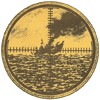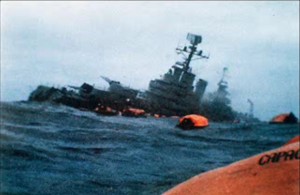We suggest listening to Malcolm Harper in the Audio Archive
On 1st April Sir Anthony Parsons, the British Ambassador at the United Nations, spoke in the Security Council and warned of the imminent danger of invasion. The following day the invasion was accomplished and the United Kingdom went straight back to the Security Council with Resolution 502 drafted in its pocket … Resolution 502 made three mandatory demands upon the member states of the United Nations:
- Immediate cessation of hostilities by both sides.
- Demanded the withdrawal of the Argentine armed forces from the islands
- Early resumption of renewed dialogue between the two states in order to seek a diplomatic resolution of the crisis.’ (Malcolm Harper, p.14)
The UK relied on the shuttle diplomacy of Alexander Haig, ‘This made it extremely difficult for the Secretary General of the United Nations to play an active open role in trying to seek a diplomatic solution to the problems of the South Atlantic in accordance with resolution 502… by refusing to use the machinery of the United Nations, the British government, a founder-member and a permanent member of the Security Council, placed the Secretary-General in an almost impossible situation because he was having to try behind the scenes to argue with the Junta in Buenos Aires and with the administration here in London, that they should be using international machinery in order to find a non-violent resolution to the conflict. And it is indeed the Secretary-General of the United Nations or a specially appointed representative of his who should have been undertaking the shuttle diplomacy between Buenos Aires and London and not the Secretary of state of the United States administration.’ (UNA Director Malcolm Harper, p.18)
This view was endorsed by Brigadier Michael Harbottle: ‘I think it was on 7th April that Mr Haig was enrolled as negotiator and he worked for about five weeks, but he was working from a basis of inexperience as an international negotiator and he was politically involved as the United States was involved… By refusing to go back to the Security Council the United Kingdom actually made it impossible for the Security Council to fulfil its obligations in terms of Article 51 of the Charter’ (p.21).
UN article 51:
‘Nothing in the present charter shall impair the inherent right of individual or collective self-defence if an armed attack occurs against a member of the United Nations, until the security Council has taken measures to maintain international peace and security.’
Sunday Times Insight Team:
‘Meanwhile events had moved to the United Nations where Britain’s diplomatic efforts had been bent with great single-mindedness towards one simple aim, keeping the Falklands issue out of the Security Council. Having won Resolution 502 the British knew that if they ever went back to the Security Council they would almost certainly be presented with something far less effective. “There was nothing more we could get from the Council” said one British official, “Our job was to keep them at bay.”’ (Malcolm Harper, p. 144). Harbottle characterised this as, ‘an action of incredible deceit and of total infidelity to the rules and to what they committed themselves to at the time of the setting up of the UN and the production of the Charter.’
When Francis Pym Britain’s Foreign Secretary went to Washington on 1st May ‘he did not actually include the Secretary-General of the United Nations on the list of people whom he wished to see’ (Harper, p.15)
Soon after, Israel invaded Lebanon in early June 1982, when bullets were still flying in the South Atlantic. Israel’s Prime minister justified it by saying: ‘If Britain can use bullets to secure its interests in the South Atlantic, then why shouldn’t I do exactly the same to secure my interest in the border region of Northern Israel?’ (Malcolm Harper, p. 145).

